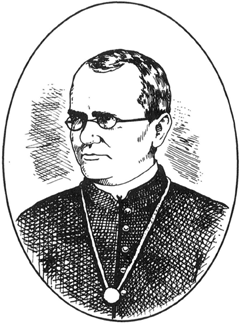Gregor Mendel
 |
| Figure 5-1 Gregor Mendel (1822-1884), whose experiments with peas demonstrated that inheritance is related to particles. (Illustration by Donna Mariano) |
It is Gregor Mendel, however, who is considered to be the father of modern genetics, the study of heredity. He was an Austrian monk who discovered the first laws of heredity and laid the foundation for the science of genetics. Surprisingly, he failed biology and was unsuccessful in gaining a teacher’s certificate primarily because of this weakness.
He joined the Augustinian Monastery in 1843, at which time he took the name Gregor. (His birth name was Johann.) He taught himself a certain amount of science, and in 1856 began some experiments on plant hybridization in the monastery garden. In time, his great weight (nearly 300 pounds) hindered his work. He had difficulty leaning over and sought to reverse his weight problem by aggressively smoking a number of cigars every day. It did not work.
Mendel experimented with garden peas, keeping statistical records regarding flower color, seed color, and whether the peas were wrinkled or smooth, the plants tall or dwarf. Two key features of his work should be emphasized: the records were statistical, and the traits he studied were either-or types of traits. He did not, for instance, track leaf size, which ranges from small to large, with all gradations in between.
Mendel became a member of the Natural Science Society, which was founded at Brunn in 1862. In 1865 and again in 1866, he presented papers before the society. After each meeting, there was gentle applause; the papers, however, were placed on a shelf to gather dust. No one seemed to have appreciated the significance of Mendel’s work.
In 1900, thirty-four years after his findings were reported to the scientific community, three investigators rediscovered Mendel’s work, all around the same time. Karl Erich Correns, E. Tschermak von Seysenegg, and Hugo DeVries independently obtained results similar to Mendel’s, and each independently rediscovered his publications. In 1900 the scientific community was better able to listen. Fame came to Gregor Mendel only after his death. Hugo DeVries is probably best known for introducing experimental methods to the study of evolution. He originated the term mutation in connection with his studies of Oenothera lamarckiana.




